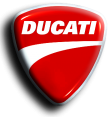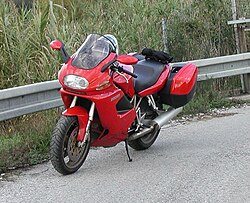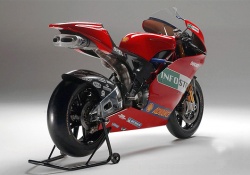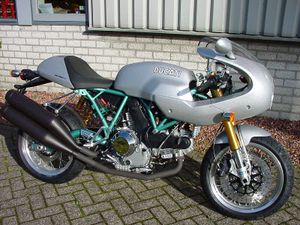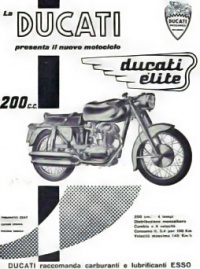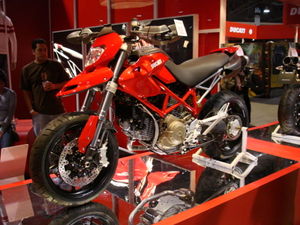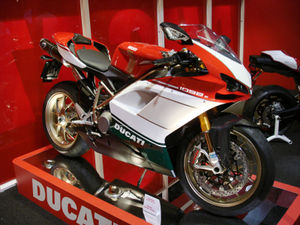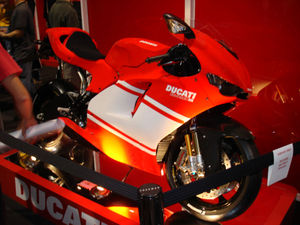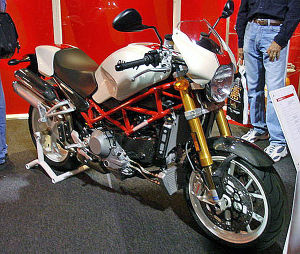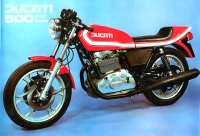Difference between revisions of "Ducati"
m |
m |
||
| (43 intermediate revisions by the same user not shown) | |||
| Line 1: | Line 1: | ||
| − | + | {{X}} | |
| + | [[Image:Ducatilogo copy.png|center|110px]] | ||
| + | {| border=1 cellspacing=3 cellpadding=4 style="float:right; margin:0 0 .5em 1em; width:300px; background:#505050; border-collapse:collapse; border:1px solid #999; font-size:83%; line-height:1.5; " summary="Infobox Automobile" | ||
| + | |- style="text-align:center; background:#505050;" | ||
| + | | colspan=2 style="padding:0; background:#808080; color:#fff; border-bottom:1px solid #999;" |<videoflash>invSaeElYUM|300|200</videoflash> | ||
| + | |- style="color:#fff; background:darkred; font-size:;" | ||
| + | ! colspan=2 style="text-align:center"|'''200 Miglia di Imola 1972-2012<br>The Beginning of a New Era''' | ||
| + | |} | ||
| + | [[image:Ducati ST4.jpg|thumb|250px|right|'''Ducati ST4''']] | ||
| + | [[Image:Ducati mach1 800.jpg|right|thumb|250px|Ducati Mach 1]] | ||
| + | [[image:Ducati 749.jpg|thumb|250px|right|'''Ducati 749 at [http://www.woiow.com Wheels Of Italy]]]''' | ||
| + | [[Image:Ducati.jpg|thumb|right|250px|Ducati MotoGP]] | ||
| + | ''Click here to see'' [[Ducati car|Ducati]] ''automotive'' | ||
| + | |||
| + | |||
| + | '''Ducati Motor Holding, [[S.A. (corporation)|SpA]]''' ([[Borsa Italiana]]:[http://www.borsaitaliana.it/bitApp/scheda.bit?target=StrumentoMTA&isin=IT0001278081&lang=en DMH]) is an [[Italy|Italian]] [[motorcycle]] manufacturer located in [[Bologna, Italy]]. | ||
| + | |||
| + | From their first post-[[World War II|Second World War]] bicycle-like low-displacement motorbikes Ducati has gained prominence in motorcycle racing and in the motorcycle industry. | ||
| + | In the 1960s, Ducati earned its place in motorcycling history by producing the then fastest 250 cc road bike available, the Mach 1. In the 1970s Ducati began producing large-displacement [[Ducati V-twin motorcycles|L-twin]] (i.e. a 90° V-twin) motorcycles and in 1973 released an L-twin with the trademarked [[desmodromic valve]] design. In 1985, [[Cagiva]] bought Ducati and planned to rebadge Ducati motorcycles with the lesser-known Cagiva name (at least outside of Italy). By the time the purchase was completed, Cagiva kept the "Ducati" name on its motorcycles. In 1996, [[Texas Pacific Group]] bought for US$325 million a 51% stake in the company and in 1998, bought the remaining 49% and became the sole owner of Ducati. In 1999, TPG issued an [[IPO]] of Ducati stock and renamed the company '''Ducati Motor Holding SpA'''. TPG sold over 65% of its shares in Ducati. In December 2005 Ducati returned to Italian ownership with the sale of Texas Pacific's stake (minus one share) to Investindustrial Holdings, the investment fund of Carlo and Andrea Bonomi. | ||
| + | ==Company history== | ||
| + | ===Ownership=== | ||
| + | * {{flagiconItaly}} (1926 - 1950) '''Ducati Family''' | ||
| + | * {{flagiconItaly}} (1950 - 1967) '''Government IRI''' management | ||
| + | ::''In 1953 split into Ducati Meccanica-now called Ducati Motor and Ducati Elettronica-now called [[Ducati Energia]]'' | ||
| + | * {{flagiconItaly}} (1967 - 1978) '''Government EFIM''' management (control over day-to-day factory operations) | ||
| + | ::''(1967 - 73) Headed By Montano | ||
| + | ::''(1973 - 78) Headed by De Eccher | ||
| + | * {{flagiconItaly}} (1978 - 1985) '''VM Group''' | ||
| + | * {{flagiconItaly}} (1985 - 1996) '''Cagiva Group''' ownership | ||
| + | * {{flagiconUSA}} (1996 - 2005) '''Texas-Pacific Group''' ownership and going public | ||
| + | ::''Headed by CEO Federico Minoli, 1996-2001; returning for 2003-2007'' | ||
| + | * {{flagiconItaly}} (2005 - 2008) '''Investindustrial Holdings SpA''' (back in Italian hands) | ||
| + | * {{flagiconItaly}} (2008 - present) '''Performance Motorcycles SpA''' (again in Italian hands and going private) | ||
| + | ::''An investment vehicle formed by Investindustrial Holdings, BS Investimenti and Hospitals of Ontario Pension Plan'' | ||
| − | + | <br> | |
| − | [[Image: | + | ===Beginnings=== |
| + | [[Image:Ducatilogol.png|300px|thumb|left|Previous logo used between 1926-2008]] | ||
| + | In 1926 three brothers, Adriano, Marcello and Bruno Ducati, founded ''Societa Scientifica Radio Brevetti Ducati'' in Bologna to produce tubes, condensers and other radio components, becoming successful enough by 1935 to construct a new factory in the Borgo Panigale area of the city. During the war, although the Ducati factory was a repeated target for Allied bombing, production was maintained. | ||
| − | + | Meanwhile, at the small [[Turin]]ese firm SIATA (''Societa Italiana per Applicazioni Tecniche Auto-Aviatorie''), Aldo Farinelli began developing a small pushrod engine for mounting on bicycles. Barely a month after the official liberation of Italy in 1944, SIATA announced its intention to sell this engine, called the "Cucciolo" (Italian for "puppy," in reference to the distinctive exhaust sound) to the public. The first Cucciolos were available alone, to be mounted on standard bicycles, by the buyer; however, businessmen soon bought the little engines in quantity, and offered complete motorized-bicycle units for sale. | |
| − | + | In 1950 (after more than 200,000 Cucciolos had been sold), in collaboration with SIATA, the Ducati firm finally offered its own Cucciolo-based motorcycle. This first Ducati motorcycle was a 60 cc bike weighing 98 pounds with a top speed of 40 mph (64 km/h) had a 15 mm [[carburetor]] giving just under 200 mpg (85 km/L). Ducati soon dropped the "Cucciolo" name in favor of "55M" and "65TL". | |
| − | + | When the market moved toward larger motorcycles, Ducati management decided to respond, making an impression at an early-1952 Milan show, introducing their 65TS cycle and Cruiser (a four-stroke [[motor scooter]]). Despite being described as the most interesting new machine at the 1952 show, the Cruiser was not a great success, and only a few thousand were made over a two-year period before the model ceased production. | |
| − | Ducati | + | In 1953, management split the company into two separate entities, Ducati Meccanica SpA and Ducati Elettronica, in acknowledgment of its diverging motorcycle and electronics product lines. (Ducati Elettronica became '''[[Ducati Energia|Ducati Energia SpA]]''' in the eighties.) Dr. Giuseppe Montano took over as head of Ducati Meccanica SpA and the Borgo Panigale factory was modernized with government assistance. By 1954, Ducati Meccanica SpA had increased production to 120 bikes a day. |
| − | [[ | + | The company's offerings have improved and diversified since then. |
| + | [[Image:Ducati mach1 800.jpg|thumb|right|Ducati Mach 1]] | ||
| + | In the 1960s, Ducati earned its place in motorcycling history by producing the then fastest 250 cc road bike available, the Mach 1. In the 1970s Ducati began producing large-displacement [[Ducati V-twin motorcycles|L-twin]] (i.e. a 90° V-twin) motorcycles and in 1973 released an L-twin with the trademarked [[desmodromic valve]] design. In 1985, [[Cagiva]] bought Ducati and planned to rebadge Ducati motorcycles with the lesser-known Cagiva name (at least outside of Italy). By the time the purchase was completed, Cagiva kept the "Ducati" name on its motorcycles. In 1996, [[Texas Pacific Group]] bought a 51% stake in the company for US$325 million then in 1998, bought most of the remaining 49% to become the sole owner of Ducati. In 1999, TPG issued an [[IPO]] of Ducati stock and renamed the company '''Ducati Motor Holding SpA'''. TPG sold over 65% of its shares in Ducati, leaving TPG the majority shareholder. In December 2005 Ducati returned to Italian ownership with the sale of Texas Pacific's stake (minus one share) to Investindustrial Holdings, the investment fund of Carlo and Andrea Bonomi. | ||
| − | + | From the 1960s to the 1990s, the Spanish '''[[MotoTrans]]''' company licensed Ducati engines and produced motorcycles that, although they incorporated subtle differences, were clearly Ducati-derived. MotoTrans's most notable machine was the 250 cc ''24 Horas'' (Spanish for ''24 hours''). A 285 cc version of this bike won the Barcelona twenty-four-hour race at the [[Montjuic circuit]] for three consecutive years, 1956 to 1958. | |
| − | |||
| + | ==Motorcycle designs== | ||
| + | |||
| + | [[Image:PaulSmartLE1000.jpg|thumb|right|2006 '''[[Ducati SportClassic|Ducati Paul Smart 1000LE]]''']] | ||
| + | Ducati is best known for high performance motorcycles characterized by large capacity four-stroke, 90-degree L-twin engines featuring a desmodromic valve design. Modern Ducatis remain among the dominant performance motorcycles available today partly because of the Desmodromic valve design, which is nearing its 50th year of use. Desmodromic valves are closed with a separate, dedicated cam lobe and lifter instead of the conventional valve [[spring (device)|spring]]s used in most internal combustion engines. This allows the cams to have a more radical profile, thus opening and closing the valves more quickly without the risk of valve-float which is likely when using a "passive" closing mechanisms under the same conditions. | ||
| + | |||
| + | While most other manufacturers utilize [[Wet clutch|wet-clutch]]es (with the spinning parts bathed in oil) Ducati uses multiplate [[dry clutch]]es in many of their current motorcycles. The dry clutch eliminates the [[parasitic loss|power loss from oil viscosity]] drag on the engine even though the engagement may not be as smooth as the oil bath versions, and the clutch plates can wear more rapidly. | ||
==Product history== | ==Product history== | ||
| + | [[Image:2f34_1.jpg|thumb|right|200px|Ducati Elite 200cc]] | ||
| + | |||
The chief designer of Ducati motorcycles from the 1950s was the late [[Fabio Taglioni]] (1920-2001). He designed most Ducatis during this period, ranging from the small single cylinder machines that were successful in the Italian 'street races' up to the large capacity twins of the 80s. Ducati introduced the [[Ducati Pantah|Pantah]] in 1979; its engine was updated in the 1990s in the [[Ducati SuperSport]] (SS) series. All modern Ducati engines are derivatives of the Pantah, which uses a toothed belt to actuate the engine's valves. Taglioni used the prancing horse (identified with the [[Ferrari]] brand) on his Ducati motorbikes, Taglioni chose this emblem of courage and daring as a sign of respect and admiration for [[Francesco Baracca]], a heroic World War I fighter pilot that died during an air raid in 1918. | The chief designer of Ducati motorcycles from the 1950s was the late [[Fabio Taglioni]] (1920-2001). He designed most Ducatis during this period, ranging from the small single cylinder machines that were successful in the Italian 'street races' up to the large capacity twins of the 80s. Ducati introduced the [[Ducati Pantah|Pantah]] in 1979; its engine was updated in the 1990s in the [[Ducati SuperSport]] (SS) series. All modern Ducati engines are derivatives of the Pantah, which uses a toothed belt to actuate the engine's valves. Taglioni used the prancing horse (identified with the [[Ferrari]] brand) on his Ducati motorbikes, Taglioni chose this emblem of courage and daring as a sign of respect and admiration for [[Francesco Baracca]], a heroic World War I fighter pilot that died during an air raid in 1918. | ||
| Line 88: | Line 132: | ||
; Motors introduced for 2007+ | ; Motors introduced for 2007+ | ||
* '''Testastretta Evoluzione''': Desmo four valve, liquid cooled, 25° included valve angle, (848/1098) | * '''Testastretta Evoluzione''': Desmo four valve, liquid cooled, 25° included valve angle, (848/1098) | ||
| + | |||
| + | |||
| + | ==Motorcycle design history== | ||
| + | [[Image:2007DucatiSR4-001.jpg|thumb|left|2007 [[Ducati Monster|Ducati Monster S4Rs Testastretta]]]] | ||
| + | Ducati (in its various incarnations) has produced several styles of motorcycle engines, including varying the number of cylinders, type of valve actuation and fuel delivery. Ducati is best known for its "L-Twin" motor which is the powerplant in the majority of Ducati-marqued motorcycles. | ||
| + | Ducati has also manufactured engines with one, two, three or four cylinders; operated by pull rod valves and push rod valves; single, double and triple overhead camshafts; [[two stroke]] and even at one stage manufactured a stationary diesel engine, many of which were used as emergency pumps (eg for fire fighting). They have also produced outboard motors for marine use. Currently, Ducati makes no other engines except for its motorcycles. | ||
| + | |||
| + | On current Ducati motors except for the Desmosedici, the valves are actuated by a standard valve cam shaft which is rotated by a [[timing belt]] driven by the motor directly. The teeth on the belt keep the [[camshaft]] drive pulleys indexed. On older Ducati motors, prior to 1986, drive was by solid shaft that transferred to the camshaft through bevel-cut gears. This method of valve actuation was used on many of Ducati's older [[single cylinder]] motorcycles - the shaft tube is visible on the outside of the cylinder. | ||
| + | |||
| + | Ducati is also famous for using the desmodromic valve system championed by engineer and designer [[Fabio Taglioni]] though they have also used engines that use valve springs to close their valves. In the early days, Ducati reserved the desmodromic valve heads for its higher performance bikes and its race bikes. These valves do not suffer from [[valve float]] at high engine speeds, thus a desmodromic engine is capable of far higher revolutions than a similarly configured engine with traditional spring-valve heads. | ||
| + | |||
| + | In the 1960s and -70s Ducati produced a wide range of small two-stroke bikes, mainly sub-100 cc capacities. Large quantities of some models were exported to the U.S. | ||
| + | [[Image:Duc1_001.jpg|thumb|right|200px|'''Ducati 500 Sport Desmo (SD) parallel twin''']] | ||
| + | Ducati has produced the following motorcycle engine types: | ||
| + | * Single cylinder, | ||
| + | **pullrod actuated, 48 cc and 65 cc (Cucciolo) | ||
| + | **pushrod actuated, 98 and 125 cc | ||
| + | **two stroke, 50, 80, 90, 100, 125cc | ||
| + | **bevel actuated, spring valved: 98 cc, 100 cc, 125 cc, 160 cc, 175 cc, 200 cc, 239 cc, 250 cc, 350 cc, 450 cc | ||
| + | **bevel actuated, desmodromic valved : 239 cc, 250 cc, 350 cc and 450 cc | ||
| + | **belt actuated, desmodromic valved : 549/572 cc [[Ducati Supermono|Supermono]], only 65 made. | ||
| + | * Two cylinder, | ||
| + | **bevel actuated, spring valved (L-Twin): 750 cc, 860 cc | ||
| + | **bevel actuated, desmo valved (L-Twin): 750 cc, 860 cc, 973 cc (Mille) | ||
| + | **chain actuated, spring valved (parallel twin): 350 cc, 500 cc (GTL) | ||
| + | **chain actuated, desmo valved (parallel twin): 500 cc (500SD) | ||
| + | **belt actuated, desmo valved (L-Twin): Almost all motors since 1986. | ||
| + | * Four cylinder, | ||
| + | **gear actuated, desmo valved (L-quattro): (Desmosedici) | ||
| + | **pushrod actuated, spring valved (L-4): Prototype [[Ducati Apollo|Apollo]], only two made. | ||
| + | |||
===Future=== | ===Future=== | ||
| Line 96: | Line 171: | ||
[[image: Ducati Race Bike.jpg|thumb|200px|'''Ducati 999 Race Bike''']] | [[image: Ducati Race Bike.jpg|thumb|200px|'''Ducati 999 Race Bike''']] | ||
| − | + | ||
| + | [[Image:Ducati logo2.jpg|center|120px]] | ||
| + | |||
| + | |||
[[Image:2006Ducati999R-001.jpg|thumb|right|2006 '''[[Ducati 999|Ducati 999R Xerox]]''']] | [[Image:2006Ducati999R-001.jpg|thumb|right|2006 '''[[Ducati 999|Ducati 999R Xerox]]''']] | ||
[[Image:2006Ducati999R-002.jpg|thumb|right|2006 '''[[Ducati 999|Ducati 999R Xerox]]''']] | [[Image:2006Ducati999R-002.jpg|thumb|right|2006 '''[[Ducati 999|Ducati 999R Xerox]]''']] | ||
| − | == | + | ==Racing History== |
| − | + | [[Image:Ducati Desmosedici GP8.jpg|thumb|right|2008 [[Ducati Desmosedici|Ducati Desmosedici GP8]] (motoGP)]] | |
| + | ''Main Article'' [[Ducati Corse]] | ||
| − | + | ===MotoGP World Championship=== | |
| + | Ducati rejoined [[Grand Prix motorcycle racing]] in {{MGP|2003}}, after a 30 year absence. On September 23, 2007 Casey Stoner clinched his and Ducati's first Grand Prix World Championship. | ||
| − | Ducati | + | When Ducati re-joined MotoGP in {{MGP|2003}}, MotoGP had changed its rules to allow four-stroke 990 cc engines to race. At the time Ducati was the fastest bike. In {{MGP|2007}}, MotoGP reduced the engine size to 800 cc, and Ducati continued to be the fastest with a bike that was markedly quicker than its rivals as was displayed by Casey Stoner on tracks with long straights. |
| − | For | + | For {{MGP|2009}}, [[Ducati Corse|Ducati Marlboro Team]] will campaign their [[Ducati Desmosedici#GP9|Desmosedici GP9]] with former World Champions [[Casey Stoner]] and [[Nicky Hayden]]. |
| + | |||
| + | Ducati also supplies [[customer]] bikes to the [[Alice Team]], with [[Mika Kallio]] and [[Niccolò Canepa]] riding for the team in 2009. | ||
| − | {| | + | |
| − | !Year | + | {| border=1 cellspacing=3 cellpadding=4 style="float:center; margin:0 0 .5em 1em; width:400px; background:#505050; border-collapse:collapse; border:1px solid #999; font-size:83%; line-height:1.5; " summary="Infobox Automobile" |
| − | + | |- style="text-align:center; background:#505050;" | |
| − | + | |- tr BGCOLOR=darkred | |
| + | !Year | ||
| + | ! Champion | ||
| + | ! Motorcycle | ||
|- | |- | ||
| + | | {{MGP|2007}} | ||
| + | | {{flagiconAUS}} [[Casey Stoner]] | ||
| + | | [[Ducati Desmosedici#GP7|Ducati Desmosedici GP7]] | ||
|} | |} | ||
| − | ===World | + | ===Superbike World Championship (SBK)=== |
| − | + | For {{SBK|2009}}, Ducati will race a homologated version of the [[Ducati 1198|1198]]. The [[Fédération Internationale de Motocyclisme|FIM]], the sanctioning body for the [[Superbike World Championship]], has raised the displacement limit for two cylinder engines to 1,200 cc. In {{SBK|2007}}, Ducati raced their 999F07 which is a homologated racing version of the [[Ducati 999|999R]] because maximum displacement for two cylinder engines was limited to 1,000 cc. | |
| − | The company has | + | The company has won thirteen [[List of Superbike World champions|rider's world championships]] since the championship's inception in 1988. It has been argued that Ducati has amassed more wins than any other manufacturer because the rules are deliberately set to favour their bikes through manufacturer lobbying; this, of course, is a matter of dispute. In 2006, Troy Bayliss' championship winning 999R was quoted to have 10 to 15 HP less than the Japanese four cylinder rivals, despite the fact that the Ducati L-Twin had less limitations imposed for tuning its engine. |
| − | {| | + | [[Image:2006Ducati999R-001.jpg|thumb|right|2006 [[Ducati 999|Ducati 999R]] (SBK)]] |
| − | !Year | + | [[Image:Duc1098R.jpg|thumb|right|2008 [[Ducati 1198|Ducati 1098R]] (SBK)]] |
| + | |||
| + | {| border=1 cellspacing=3 cellpadding=4 style="float:center; margin:0 0 .5em 1em; width:400px; background:#505050; border-collapse:collapse; border:1px solid #999; font-size:83%; line-height:1.5; " summary="Infobox Automobile" | ||
| + | |- style="text-align:center; background:#505050;" | ||
| + | |- tr BGCOLOR=darkred | ||
| + | ! Year | ||
| + | ! Champion | ||
| + | ! Motorcycle | ||
| + | |- | ||
| + | | {{SBK|1990}} | ||
| + | | {{flagiconFRA}} [[Raymond Roche]] | ||
| + | | [[Ducati 851]] | ||
| + | |- | ||
| + | | {{SBK|1991}} | ||
| + | | {{flagiconUSA}} [[Doug Polen]] | ||
| + | | [[Ducati 888]] | ||
| + | |- | ||
| + | | {{SBK|1992}} | ||
| + | | {{flagiconUSA}} Doug Polen | ||
| + | | Ducati 888 | ||
| + | |- | ||
| + | | {{SBK|1994}} | ||
| + | | {{flagiconUK}} [[Carl Fogarty]] | ||
| + | | [[Ducati 916]] | ||
|- | |- | ||
| − | | | + | | {{SBK|1995}} |
| + | | {{flagiconUK}} Carl Fogarty | ||
| + | | Ducati 916 | ||
|- | |- | ||
| − | | | + | | {{SBK|1996}} |
| + | | {{flagiconAUS}} [[Troy Corser]] | ||
| + | | Ducati 916 | ||
|- | |- | ||
| − | | | + | | {{SBK|1998}} |
| + | | {{flagiconUK}} Carl Fogarty | ||
| + | | Ducati 916 | ||
|- | |- | ||
| − | | | + | | {{SBK|1999}} |
| + | | {{flagiconUK}} Carl Fogarty | ||
| + | | [[Ducati 996]] | ||
|- | |- | ||
| − | | | + | | {{SBK|2001}} |
| + | | {{flagiconAUS}} [[Troy Bayliss]] | ||
| + | | Ducati 996 | ||
|- | |- | ||
| − | | | + | | {{SBK|2003}} |
| + | | {{flagiconUK}} [[Neil Hodgson]] | ||
| + | | [[Ducati 999]] | ||
|- | |- | ||
| − | | | + | | {{SBK|2004}} |
| + | | {{flagiconUK}} [[James Toseland]] | ||
| + | | Ducati 999 | ||
|- | |- | ||
| − | | | + | | {{SBK|2006}} |
| + | | {{flagiconAUS}} [[Troy Bayliss]] | ||
| + | | Ducati 999 | ||
|- | |- | ||
| − | | | + | | {{SBK|2008}} |
| + | | {{flagiconAUS}} [[Troy Bayliss]] | ||
| + | | [[Ducati 1098|Ducati 1098]] | ||
| + | |} | ||
| + | |||
| + | Ducati has also won fifteen SBK [[List of Superbike World champions#Manufacturers|manufacturer world championships]] for years 1991–1996, 1998–2004, 2006 and 2008. | ||
| + | |||
| + | ===British Superbike Championship=== | ||
| + | The [[British Superbike Championship]] has been won by Ducati riders on eight occasions and entered since 1988: | ||
| + | {| border=1 cellspacing=3 cellpadding=4 style="float:center; margin:0 0 .5em 1em; width:400px; background:#505050; border-collapse:collapse; border:1px solid #999; font-size:83%; line-height:1.5; " summary="Infobox Automobile" | ||
| + | |- style="text-align:center; background:#505050;" | ||
| + | |- tr BGCOLOR=darkred | ||
| + | ! Year | ||
| + | ! Champion | ||
| + | ! Motorcycle | ||
|- | |- | ||
| − | | | + | | 1995 |
| + | | {{flagiconScotland}} [[Steve Hislop]] | ||
| + | | [[Ducati 916]] | ||
|- | |- | ||
| − | | | + | | 1999 |
| + | | {{flagiconAustralia}} [[Troy Bayliss]] | ||
| + | | [[Ducati 996]] | ||
|- | |- | ||
| − | | | + | | 2000 |
| + | | {{flagiconEngland}} [[Neil Hodgson]] | ||
| + | | Ducati 996 | ||
|- | |- | ||
| + | | 2001 | ||
| + | | {{flagiconEngland}} [[John Reynolds]] | ||
| + | | Ducati 996 | ||
| + | |- | ||
| + | | 2002 | ||
| + | | {{flagiconScotland}} [[Steve Hislop]] | ||
| + | | [[Ducati 998]] | ||
| + | |- | ||
| + | | 2003 | ||
| + | | {{flagiconEngland}} [[Shane Byrne]] | ||
| + | | Ducati 998 | ||
| + | |- | ||
| + | | 2005 | ||
| + | | {{flagiconSpain}} [[Gregorio Lavilla]] | ||
| + | | [[Ducati 999]] | ||
| + | |- | ||
| + | | 2008 | ||
| + | | {{flagiconEngland}} [[Shane Byrne (motorcycle racer)|Shane Byrne]] | ||
| + | | [[Ducati 1098]] | ||
|} | |} | ||
| − | |||
| − | ===AMA Superbike=== | + | ===AMA Superbike Championship=== |
| − | In the [[AMA Superbike]] | + | In the [[AMA Superbike Championship]], Ducati has had its share of success, with [[Doug Polen]] winning the title in 1993 and [[Troy Corser]] the following year in 1994. Ducati has entered a bike in every AMA Superbike season since 1986, but withdrew from the series after the 2006 season. |
| + | |||
| + | {| border=1 cellspacing=3 cellpadding=4 style="float:center; margin:0 0 .5em 1em; width:400px; background:#505050; border-collapse:collapse; border:1px solid #999; font-size:83%; line-height:1.5; " summary="Infobox Automobile" | ||
| + | |- style="text-align:center; background:#505050;" | ||
| + | |- tr BGCOLOR=darkred | ||
| + | ! Year | ||
| + | ! Champion | ||
| + | ! Motorcycle | ||
| + | |- | ||
| + | | 1993 | ||
| + | | {{flagiconUnited States}} [[Doug Polen]] | ||
| + | | [[Ducati 888]] | ||
| + | |- | ||
| + | | 1994 | ||
| + | | {{flagiconAustralia}} [[Troy Corser]] | ||
| + | | [[Ducati 916]] | ||
| + | |} | ||
===British Superbike=== | ===British Superbike=== | ||
| Line 165: | Line 346: | ||
2005 Gregorio Lavilla, Spain | 2005 Gregorio Lavilla, Spain | ||
| − | |||
| − | |||
== See also == | == See also == | ||
| Line 174: | Line 353: | ||
==External links== | ==External links== | ||
Official Ducati links: | Official Ducati links: | ||
| + | *[http://www.ducatiusa.com/museo/virtual_tour/flash_GB/home.html '''3D Ducati Museum Tour''' - Flash] | ||
*[http://www.ducati.com Ducati main website] The manufacturer's main website; current model info, including online information, history, manuals and race team info (Italian/English) | *[http://www.ducati.com Ducati main website] The manufacturer's main website; current model info, including online information, history, manuals and race team info (Italian/English) | ||
*[http://www.ducatiusa.com Ducati North America website] Ducati NA information for USA and Canada. | *[http://www.ducatiusa.com Ducati North America website] Ducati NA information for USA and Canada. | ||
| Line 199: | Line 379: | ||
* [http://www.usq.edu.au/users/grantd/motorcycle/ducati/DESMO.HTM Desmodromic Valve Gear] What does desmo mean? | * [http://www.usq.edu.au/users/grantd/motorcycle/ducati/DESMO.HTM Desmodromic Valve Gear] What does desmo mean? | ||
| + | Videos: | ||
| + | *[http://www.youtube.com/watch?v=5_37_gOepAg Ducati Superbike Concorso Finals 2007 Video] | ||
| − | |||
| − | |||
| + | {{Ducati}} | ||
| − | {{ | + | {{-}} |
| + | Send what you have to: | ||
| + | *[mailto:Info@WheelsofItaly.com '''info@wheelsofitaly.com'''] | ||
| + | |||
| + | |||
| + | |||
| + | {{-}} | ||
| + | {{A-Z multipage list|Motorcycle Information and Photos by Marque|Motorcycle Information and Photos by Marque|}} | ||
| + | {{A-Z multipage list|Car Information and Photos by Marque|Information and Photos by Marque|}} | ||
| + | <br> | ||
{{Motorcycle Information and Photos by Marque}} | {{Motorcycle Information and Photos by Marque}} | ||
{{Car Information and Photos by Marque}} | {{Car Information and Photos by Marque}} | ||
| + | |||
| + | |||
| + | [[Category:Motorcycle manufacturers of Italy]] | ||
| + | [[Category: Motorcycles]] | ||
Latest revision as of 13:35, 26 November 2013
| 200 Miglia di Imola 1972-2012 The Beginning of a New Era |
|---|
Click here to see Ducati automotive
Ducati Motor Holding, SpA (Borsa Italiana:DMH) is an Italian motorcycle manufacturer located in Bologna, Italy.
From their first post-Second World War bicycle-like low-displacement motorbikes Ducati has gained prominence in motorcycle racing and in the motorcycle industry.
In the 1960s, Ducati earned its place in motorcycling history by producing the then fastest 250 cc road bike available, the Mach 1. In the 1970s Ducati began producing large-displacement L-twin (i.e. a 90° V-twin) motorcycles and in 1973 released an L-twin with the trademarked desmodromic valve design. In 1985, Cagiva bought Ducati and planned to rebadge Ducati motorcycles with the lesser-known Cagiva name (at least outside of Italy). By the time the purchase was completed, Cagiva kept the "Ducati" name on its motorcycles. In 1996, Texas Pacific Group bought for US$325 million a 51% stake in the company and in 1998, bought the remaining 49% and became the sole owner of Ducati. In 1999, TPG issued an IPO of Ducati stock and renamed the company Ducati Motor Holding SpA. TPG sold over 65% of its shares in Ducati. In December 2005 Ducati returned to Italian ownership with the sale of Texas Pacific's stake (minus one share) to Investindustrial Holdings, the investment fund of Carlo and Andrea Bonomi.
Company history
Ownership
- In 1953 split into Ducati Meccanica-now called Ducati Motor and Ducati Elettronica-now called Ducati Energia
- (1967 - 73) Headed By Montano
- (1973 - 78) Headed by De Eccher
 (1978 - 1985) VM Group
(1978 - 1985) VM Group (1985 - 1996) Cagiva Group ownership
(1985 - 1996) Cagiva Group ownership (1996 - 2005) Texas-Pacific Group ownership and going public
(1996 - 2005) Texas-Pacific Group ownership and going public
- Headed by CEO Federico Minoli, 1996-2001; returning for 2003-2007
 (2005 - 2008) Investindustrial Holdings SpA (back in Italian hands)
(2005 - 2008) Investindustrial Holdings SpA (back in Italian hands) (2008 - present) Performance Motorcycles SpA (again in Italian hands and going private)
(2008 - present) Performance Motorcycles SpA (again in Italian hands and going private)
- An investment vehicle formed by Investindustrial Holdings, BS Investimenti and Hospitals of Ontario Pension Plan
Beginnings
In 1926 three brothers, Adriano, Marcello and Bruno Ducati, founded Societa Scientifica Radio Brevetti Ducati in Bologna to produce tubes, condensers and other radio components, becoming successful enough by 1935 to construct a new factory in the Borgo Panigale area of the city. During the war, although the Ducati factory was a repeated target for Allied bombing, production was maintained.
Meanwhile, at the small Turinese firm SIATA (Societa Italiana per Applicazioni Tecniche Auto-Aviatorie), Aldo Farinelli began developing a small pushrod engine for mounting on bicycles. Barely a month after the official liberation of Italy in 1944, SIATA announced its intention to sell this engine, called the "Cucciolo" (Italian for "puppy," in reference to the distinctive exhaust sound) to the public. The first Cucciolos were available alone, to be mounted on standard bicycles, by the buyer; however, businessmen soon bought the little engines in quantity, and offered complete motorized-bicycle units for sale.
In 1950 (after more than 200,000 Cucciolos had been sold), in collaboration with SIATA, the Ducati firm finally offered its own Cucciolo-based motorcycle. This first Ducati motorcycle was a 60 cc bike weighing 98 pounds with a top speed of 40 mph (64 km/h) had a 15 mm carburetor giving just under 200 mpg (85 km/L). Ducati soon dropped the "Cucciolo" name in favor of "55M" and "65TL".
When the market moved toward larger motorcycles, Ducati management decided to respond, making an impression at an early-1952 Milan show, introducing their 65TS cycle and Cruiser (a four-stroke motor scooter). Despite being described as the most interesting new machine at the 1952 show, the Cruiser was not a great success, and only a few thousand were made over a two-year period before the model ceased production.
In 1953, management split the company into two separate entities, Ducati Meccanica SpA and Ducati Elettronica, in acknowledgment of its diverging motorcycle and electronics product lines. (Ducati Elettronica became Ducati Energia SpA in the eighties.) Dr. Giuseppe Montano took over as head of Ducati Meccanica SpA and the Borgo Panigale factory was modernized with government assistance. By 1954, Ducati Meccanica SpA had increased production to 120 bikes a day.
The company's offerings have improved and diversified since then.
In the 1960s, Ducati earned its place in motorcycling history by producing the then fastest 250 cc road bike available, the Mach 1. In the 1970s Ducati began producing large-displacement L-twin (i.e. a 90° V-twin) motorcycles and in 1973 released an L-twin with the trademarked desmodromic valve design. In 1985, Cagiva bought Ducati and planned to rebadge Ducati motorcycles with the lesser-known Cagiva name (at least outside of Italy). By the time the purchase was completed, Cagiva kept the "Ducati" name on its motorcycles. In 1996, Texas Pacific Group bought a 51% stake in the company for US$325 million then in 1998, bought most of the remaining 49% to become the sole owner of Ducati. In 1999, TPG issued an IPO of Ducati stock and renamed the company Ducati Motor Holding SpA. TPG sold over 65% of its shares in Ducati, leaving TPG the majority shareholder. In December 2005 Ducati returned to Italian ownership with the sale of Texas Pacific's stake (minus one share) to Investindustrial Holdings, the investment fund of Carlo and Andrea Bonomi.
From the 1960s to the 1990s, the Spanish MotoTrans company licensed Ducati engines and produced motorcycles that, although they incorporated subtle differences, were clearly Ducati-derived. MotoTrans's most notable machine was the 250 cc 24 Horas (Spanish for 24 hours). A 285 cc version of this bike won the Barcelona twenty-four-hour race at the Montjuic circuit for three consecutive years, 1956 to 1958.
Motorcycle designs
Ducati is best known for high performance motorcycles characterized by large capacity four-stroke, 90-degree L-twin engines featuring a desmodromic valve design. Modern Ducatis remain among the dominant performance motorcycles available today partly because of the Desmodromic valve design, which is nearing its 50th year of use. Desmodromic valves are closed with a separate, dedicated cam lobe and lifter instead of the conventional valve springs used in most internal combustion engines. This allows the cams to have a more radical profile, thus opening and closing the valves more quickly without the risk of valve-float which is likely when using a "passive" closing mechanisms under the same conditions.
While most other manufacturers utilize wet-clutches (with the spinning parts bathed in oil) Ducati uses multiplate dry clutches in many of their current motorcycles. The dry clutch eliminates the power loss from oil viscosity drag on the engine even though the engagement may not be as smooth as the oil bath versions, and the clutch plates can wear more rapidly.
Product history
The chief designer of Ducati motorcycles from the 1950s was the late Fabio Taglioni (1920-2001). He designed most Ducatis during this period, ranging from the small single cylinder machines that were successful in the Italian 'street races' up to the large capacity twins of the 80s. Ducati introduced the Pantah in 1979; its engine was updated in the 1990s in the Ducati SuperSport (SS) series. All modern Ducati engines are derivatives of the Pantah, which uses a toothed belt to actuate the engine's valves. Taglioni used the prancing horse (identified with the Ferrari brand) on his Ducati motorbikes, Taglioni chose this emblem of courage and daring as a sign of respect and admiration for Francesco Baracca, a heroic World War I fighter pilot that died during an air raid in 1918.
1950s
Main article: Ducati Singles
1960s
Main article: Ducati Apollo
1970s
Main article: Ducati V-twin motorcycles
In 1973, Ducati also commemorated its 1972 win at the Imola 200 with the production model green frame Ducati 750 SuperSport.
(In 2006 the retro styled Ducati PaulSmart1000LE, which shares styling cues with the 1973 750 SuperSport (itself a production replica of Paul Smart's 1972 race winning 750 Imola Desmo) was released, as one of a SportClassic series representing the 750 GT, 750 Sport, and 750 SuperSport Ducati motorcycles.)
1980s
Main article: Ducati Quattrovalvole motorcycles
Ducati's liquid-cooled multi-valve V twins made from 1985 on are known as Quattrovalvole ("four-valve"). These include the 916 and 996, 999 and a few predecessors and derivatives.
1990s
In 1993, Miguel Angel Galuzzi introduced the Ducati Monster, a naked bike with exposed trellis and engine. Today the Monster accounts for almost half of the company's worldwide sales. The Monster, which has been out since 1994, has undergone the most changes of any motorcycle that Ducati has ever produced. After more than a decade of manufacturing, Ducati continues to create innovative changes to this classic motorcycle.
In 1995, the company introduced the Ducati 916 model designed by Massimo Tamburini, a water-cooled version that allowed for higher output levels and a striking new bodywork that featured aggressive lines, underseat exhausts, and a single-sided swingarm. Ducati has since ceased production of what many called the bike of the 1990s, supplanting it with the 749 and 999.
Current lineup
For the 2008 model year, Ducati lineup is as follows:
- 695
- 696
- S2R 1000
- S4R Testastretta
- S4R S Testastretta
- S4R S Testastretta Tri-Colore
- 1100
- 1100 S
- GT 1000
- Sport 1000 monoposto
- Sport 1000 biposto
- Sport 1000 S biposto
- ST3
- ST3 S ABS
- Other
- Motors used in 2006
- Desmodue: Desmo two valve air cooled, 40° included valve angle, (800SS, Multistrada 620, Monster 620 695 803 992)
- Desmodue Double Spark: Desmo two valve , air cooled, 40° included valve angle, (1000DS, Multistrada 1000DS)
- Desmotre Double Spark: Desmo three valve, liquid cooled, 40° included valve angle, (ST3)
- Desmoquattro Testastretta: Desmo four valve, liquid cooled, 25° included valve angle, (999, 749, Monster S4RS)
- Motors introduced for 2007+
- Testastretta Evoluzione: Desmo four valve, liquid cooled, 25° included valve angle, (848/1098)
Motorcycle design history
Ducati (in its various incarnations) has produced several styles of motorcycle engines, including varying the number of cylinders, type of valve actuation and fuel delivery. Ducati is best known for its "L-Twin" motor which is the powerplant in the majority of Ducati-marqued motorcycles. Ducati has also manufactured engines with one, two, three or four cylinders; operated by pull rod valves and push rod valves; single, double and triple overhead camshafts; two stroke and even at one stage manufactured a stationary diesel engine, many of which were used as emergency pumps (eg for fire fighting). They have also produced outboard motors for marine use. Currently, Ducati makes no other engines except for its motorcycles.
On current Ducati motors except for the Desmosedici, the valves are actuated by a standard valve cam shaft which is rotated by a timing belt driven by the motor directly. The teeth on the belt keep the camshaft drive pulleys indexed. On older Ducati motors, prior to 1986, drive was by solid shaft that transferred to the camshaft through bevel-cut gears. This method of valve actuation was used on many of Ducati's older single cylinder motorcycles - the shaft tube is visible on the outside of the cylinder.
Ducati is also famous for using the desmodromic valve system championed by engineer and designer Fabio Taglioni though they have also used engines that use valve springs to close their valves. In the early days, Ducati reserved the desmodromic valve heads for its higher performance bikes and its race bikes. These valves do not suffer from valve float at high engine speeds, thus a desmodromic engine is capable of far higher revolutions than a similarly configured engine with traditional spring-valve heads.
In the 1960s and -70s Ducati produced a wide range of small two-stroke bikes, mainly sub-100 cc capacities. Large quantities of some models were exported to the U.S.
Ducati has produced the following motorcycle engine types:
- Single cylinder,
- pullrod actuated, 48 cc and 65 cc (Cucciolo)
- pushrod actuated, 98 and 125 cc
- two stroke, 50, 80, 90, 100, 125cc
- bevel actuated, spring valved: 98 cc, 100 cc, 125 cc, 160 cc, 175 cc, 200 cc, 239 cc, 250 cc, 350 cc, 450 cc
- bevel actuated, desmodromic valved : 239 cc, 250 cc, 350 cc and 450 cc
- belt actuated, desmodromic valved : 549/572 cc Supermono, only 65 made.
- Two cylinder,
- bevel actuated, spring valved (L-Twin): 750 cc, 860 cc
- bevel actuated, desmo valved (L-Twin): 750 cc, 860 cc, 973 cc (Mille)
- chain actuated, spring valved (parallel twin): 350 cc, 500 cc (GTL)
- chain actuated, desmo valved (parallel twin): 500 cc (500SD)
- belt actuated, desmo valved (L-Twin): Almost all motors since 1986.
- Four cylinder,
- gear actuated, desmo valved (L-quattro): (Desmosedici)
- pushrod actuated, spring valved (L-4): Prototype Apollo, only two made.
Future
Ducati had completed testing the Desmosedici GP7, Ducati's 2007 MotoGP race bike. The GP7 complies with new regulations requiring a maximum of 800 cc (as compared with the 989 cc of the GP6). The GP7 is currently known to be the most powerful 800 cc MotoGP race bike, as illustrated in the 2007 Qatar GP, where the four Ducatis produced, by a considerable margin, the highest top speeds of the entire MotoGP grid.
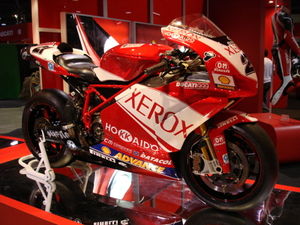
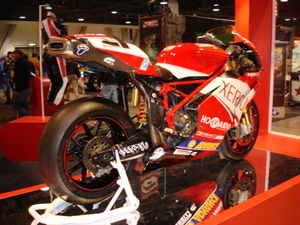
Racing History
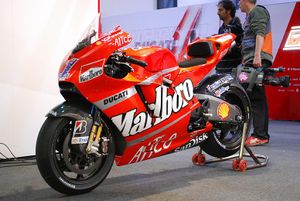
Main Article Ducati Corse
MotoGP World Championship
Ducati rejoined Grand Prix motorcycle racing in 2003, after a 30 year absence. On September 23, 2007 Casey Stoner clinched his and Ducati's first Grand Prix World Championship.
When Ducati re-joined MotoGP in 2003, MotoGP had changed its rules to allow four-stroke 990 cc engines to race. At the time Ducati was the fastest bike. In 2007, MotoGP reduced the engine size to 800 cc, and Ducati continued to be the fastest with a bike that was markedly quicker than its rivals as was displayed by Casey Stoner on tracks with long straights.
For 2009, Ducati Marlboro Team will campaign their Desmosedici GP9 with former World Champions Casey Stoner and Nicky Hayden.
Ducati also supplies customer bikes to the Alice Team, with Mika Kallio and Niccolò Canepa riding for the team in 2009.
| Year | Champion | Motorcycle |
|---|---|---|
| 2007 | Ducati Desmosedici GP7 |
Superbike World Championship (SBK)
For 2009, Ducati will race a homologated version of the 1198. The FIM, the sanctioning body for the Superbike World Championship, has raised the displacement limit for two cylinder engines to 1,200 cc. In 2007, Ducati raced their 999F07 which is a homologated racing version of the 999R because maximum displacement for two cylinder engines was limited to 1,000 cc.
The company has won thirteen rider's world championships since the championship's inception in 1988. It has been argued that Ducati has amassed more wins than any other manufacturer because the rules are deliberately set to favour their bikes through manufacturer lobbying; this, of course, is a matter of dispute. In 2006, Troy Bayliss' championship winning 999R was quoted to have 10 to 15 HP less than the Japanese four cylinder rivals, despite the fact that the Ducati L-Twin had less limitations imposed for tuning its engine.

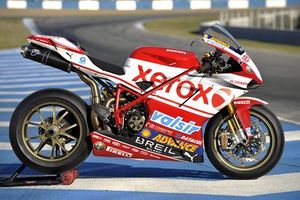
| Year | Champion | Motorcycle |
|---|---|---|
| 1990 | Ducati 851 | |
| 1991 | Ducati 888 | |
| 1992 | Ducati 888 | |
| 1994 | Ducati 916 | |
| 1995 | Ducati 916 | |
| 1996 | Ducati 916 | |
| 1998 | Ducati 916 | |
| 1999 | Ducati 996 | |
| 2001 | Ducati 996 | |
| 2003 | Ducati 999 | |
| 2004 | Ducati 999 | |
| 2006 | Ducati 999 | |
| 2008 | Ducati 1098 |
Ducati has also won fifteen SBK manufacturer world championships for years 1991–1996, 1998–2004, 2006 and 2008.
British Superbike Championship
The British Superbike Championship has been won by Ducati riders on eight occasions and entered since 1988:
| Year | Champion | Motorcycle |
|---|---|---|
| 1995 | Ducati 916 | |
| 1999 | Ducati 996 | |
| 2000 | Ducati 996 | |
| 2001 | Ducati 996 | |
| 2002 | Ducati 998 | |
| 2003 | Ducati 998 | |
| 2005 | Ducati 999 | |
| 2008 | Ducati 1098 |
AMA Superbike Championship
In the AMA Superbike Championship, Ducati has had its share of success, with Doug Polen winning the title in 1993 and Troy Corser the following year in 1994. Ducati has entered a bike in every AMA Superbike season since 1986, but withdrew from the series after the 2006 season.
| Year | Champion | Motorcycle |
|---|---|---|
| 1993 | Ducati 888 | |
| 1994 | Ducati 916 |
British Superbike
The British Superbike series has been won by Ducati riders on seven occasions: 1995 Steve Hislop, Scotland; 1999 Troy Bayliss, Australia; 2000 Neil Hodgson, England; 2001 John Reynolds, England; 2002 Steve Hislop, Scotland; 2003 Shane Byrne, England; 2005 Gregorio Lavilla, Spain
See also
External links
Official Ducati links:
- 3D Ducati Museum Tour - Flash
- Ducati main website The manufacturer's main website; current model info, including online information, history, manuals and race team info (Italian/English)
- Ducati North America website Ducati NA information for USA and Canada.
- Ducati Japan website Ducati NA information for Japan (Japanese).
Enthusiast and owner group sites:
- Ducati Multistrada List Ducati Multistrada pictures, discussion, technical assistance, owner feedback forums, ride stories, links, manuals, movies, marketplace, racing and more (English).
- Duc.nu Ducati pictures, manuals, movies, racing and more (Dutch/English).
- Ducati Webring Created in 1996 this webring is a collective of currently 132 active Ducati related websites.
- Ducati Monster List USA-based Monster Owners resource and community forum site
- The Ducati Owners Club GB The largest and oldest Ducati club worldwide, based in the UK.
- The Ducati Sporting Club Home of the UK's newest club for Ducati owners and enthusiasts.
- The Monster Owners Club UK-based club for Ducati Monster Owners
- UK Ducati Forum (Ducatisti.co.uk) Free forum for chat and technical help, pictures, videos, classifieds, meets, ride-outs and more!
- BevelHeaven - Classic Bevel Drive Ducati Forum Ducati Singles and Twins through until 1985.
- Ducati Meccanica Website Information, photos, and resources for all classic Ducati Bevel drive motorcycles (1954 to 1985).
- Ducati Owners site and home to the largest MH900e registry
- The Ducati Portal Ducati owners discussion site, all Ducati bikes.
- Ducatistas.com Spain's biggest Ducati fan club, free chat, forums, meetings, events, and more.
- 1996 900SS/SP Registry Dedicated registry for the 1996 900SS/SP.
- Ducati Dealers Online guide to the World's leading Ducati Dealers.
Ducati technical reference sites:
- Desmo Times This site includes DIY information and resources for Ducati Enthusiasts to be able to maintain their own Ducatis.
- Desmodromic Valve Gear What does desmo mean?
Videos:
| Scrambler 250 | M620 Monster | 620 SPORT | 748 | 748S | 749 | 749/R/S | 750 Imola | 750 SS | 800 Sport | 800 SS | 848 | 851 | 888 Superbike | 900SS | 900GTS | 916 | 996 | 998 | 999 | 999/R/S | 1098 | 1198 | Apollo | Desmosedici | Hypermotard | Monster | Multistrada | Pantah | Paso | Sport 1000 Classic | 1000DS | PaulSmart1000LE | ST2 | ST3 | ST4 | ST4S | SuperSport | |
| Current motorcycles: | Multistrada (Multistrada 1200) · Desmosedici · Desmosedici RR · Monster 696 · Monster · SportClassic · 848 · 1098 · 1198 · Hypermotard · Streetfighter | |
|---|---|---|
| Previous motorcycles: | 60, 60S, 65S · 65T, 65TL, 65TS · 98, 98N, 98T, 98TL, 98S, 98SS · 125 S, SV · 125 Gran Sport Mariana · 125 Aurea · 98TS and 85, 98, 125 Bronco · Mach 1 · Apollo · 750 GT ·750 Imola · Supermono · 800SS · 851 · 888 · 900GTS · 748 · 749 · 916 · 996 · 998 · 999 · Pantah · Paso · PaulSmart1000LE · ST series (ST2 · ST3 · ST4) · SuperSport | |
| Ducati mopeds: | Cucciolo · 55 · Brisk · Falcon · Rolly | |
| Designers | Fabbro · Galluzzi · Taglioni · Tamburini · Terblanche | |
| Racing division: | Ducati Corse | |
Send what you have to:
| Motorcycle Information and Photos by Marque: A - B - C - D - E - F - G - H - I - J - K - L - M - N - O - P - Q - R - S - T - U - V - W - X - Y - Z |
| Car Information and Photos by Marque: A - B - C - D - E - F - G - H - I - J - K - L - M - N - O - P - Q - R - S - T - U - V - W - X - Y - Z |
